Claude Forthomme's Blog, page 39
October 3, 2013
Big Change in Italy: Berlusconi is Out for Good
In the recent political crisis in Italy that nearly brought down the coalition government and caused tremors across Europe as fears that the third economy in the Euro-zone was about to collapse in political chaos, Berlusconi made two strategic mistakes. Big mistakes that foreign correspondants in Italy, including the New York Times, have failed to grasp.
This is perhaps not so surprising as Italian politics can be exceedingly murky. Since I've lived here 40 years and I am close to the situation, let me try to unravel the mystery for you.
It all goes back to two blunders Berlusconi recently made, no doubt the result of his own personal hubris and conviction that he's the boss and everyone will follow him, no questions asked.
To which he added a last minute false step yesterday at the end of the vote of confidence in Parliament. He made a so-called "u-turn" (see articles below) and decided to support Prime Minister Enrico Letta in the hope of pulling his followers together. That made him look ridiculous, even though the foreign press didn't "get it" and thought he'd helped save the government.
But it was too late! He didn't save anything, the vote was already in and many of his party members appeared not to have realized he'd changed his mind! A perfect comedy of errors that was very visible on television last night with Berlusconi collapsing in tears:

(Photo credit: Yahoo News)
The giant has finally fallen off his pinnacle and won't rise again, the "charismatic leader" has lost his carisma. The vote of confidence was overwhelming in both chambers, at the parliament (435 yes, 162 no) and especially in the Senate that Berlusconi was supposed to control (235 yes, 70 no). Senators that used to follow Berlusconi have stopped following him, providing the Letta-Alfano government with what the Italian press calls "self sufficiency" (or autonomy from Berlusconi and any other opponent, including the M5S, Grillo's new party). The coalition government is now secure until 2015, exactly as young Prime Minister Letta wanted it (he's only 47).

Enrico Letta (Photo credit Wikipedia)
Berlusconi's party, the PDL, is in tatters, and a new group in the PDL party has risen around Angelino Alfano, the Deputy Prime Minister, the PDL party secretary and the man who was once seen as Berlusconi's possible successor and (in any case) his protégé since Berlusconi has never wanted to designate a successor.

Angelino Alfano (photo credit Wikipedia)
So what were Berlusconi's two major mistakes?
1. Some two weeks ago, he unilaterally tried to revive the original party he had created back in 1992 when he started his political career, Forza Italia. He'd hoped to infuse renewed vigor in his PDL party but only managed to create a sense of surprise and confusion among his followers. Now, unless you go to elections and register a new name for a party, you cannot change a name just like that. At best, you can create a group with that name within an existing party, clearly a move that has the effect of fragmenting the party - strangely enough, Berlusconi, maybe because he is too old (77) and too full of himself, didn't see it coming.
2. When he decided to cause a government crisis by removing the five PDL ministers from the government, he didn't consult Alfano in spite of the important positions this ex-protégé of his had in both the coalition government (he's the Deputy Prime Minister) and the PDL (as secretary of the party). Berlusconi did this all on his own, with just a few extremists around him, no doubt yes-men.
Berlusconi's problems are not over now. They are just beginning: a Senate commission starts deliberating on Friday this week whether to expel him from the Senate because of his tax fraud conviction. Tax fraud is viewed seriously: it is a tenet in the Italian Constitution that such a conviction is proof he is "immoral" and cannot hold a political position. Everyone expects the Senate to expel Berlusconi.
And once he's lost the protection of the Senate, he is going to be in deep trouble, because he is accused of many more felonies, abuse of power, corruption, allegations of sexual misconduct with young girls etc etc (for a list of controversies affecting him, see here)
So the Berlusconi era is over. What next?
Looking to the future, Italy has now two young promising politicians that have shown they were adept at moving through a complicated crisis like this one: Enrico Letta and Angelino Alfano. Hopefully, they are now in a strong position to guide the country out of the recession.
What is your opinion?
Related articles
 Berlusconi faces revolt over confidence vote(aljazeera.com)
Berlusconi faces revolt over confidence vote(aljazeera.com)
 Berlusconi U-turn on confidence vote(bbc.co.uk)
Berlusconi U-turn on confidence vote(bbc.co.uk)
 Silvio Berlusconi makes humiliating climbdown in Italian parliament(theguardian.com)
Silvio Berlusconi makes humiliating climbdown in Italian parliament(theguardian.com)
 Italy: Ministers of Berlusconi's party resign(euronews.com)
Italy: Ministers of Berlusconi's party resign(euronews.com)










This is perhaps not so surprising as Italian politics can be exceedingly murky. Since I've lived here 40 years and I am close to the situation, let me try to unravel the mystery for you.
It all goes back to two blunders Berlusconi recently made, no doubt the result of his own personal hubris and conviction that he's the boss and everyone will follow him, no questions asked.
To which he added a last minute false step yesterday at the end of the vote of confidence in Parliament. He made a so-called "u-turn" (see articles below) and decided to support Prime Minister Enrico Letta in the hope of pulling his followers together. That made him look ridiculous, even though the foreign press didn't "get it" and thought he'd helped save the government.
But it was too late! He didn't save anything, the vote was already in and many of his party members appeared not to have realized he'd changed his mind! A perfect comedy of errors that was very visible on television last night with Berlusconi collapsing in tears:

(Photo credit: Yahoo News)
The giant has finally fallen off his pinnacle and won't rise again, the "charismatic leader" has lost his carisma. The vote of confidence was overwhelming in both chambers, at the parliament (435 yes, 162 no) and especially in the Senate that Berlusconi was supposed to control (235 yes, 70 no). Senators that used to follow Berlusconi have stopped following him, providing the Letta-Alfano government with what the Italian press calls "self sufficiency" (or autonomy from Berlusconi and any other opponent, including the M5S, Grillo's new party). The coalition government is now secure until 2015, exactly as young Prime Minister Letta wanted it (he's only 47).

Enrico Letta (Photo credit Wikipedia)
Berlusconi's party, the PDL, is in tatters, and a new group in the PDL party has risen around Angelino Alfano, the Deputy Prime Minister, the PDL party secretary and the man who was once seen as Berlusconi's possible successor and (in any case) his protégé since Berlusconi has never wanted to designate a successor.

Angelino Alfano (photo credit Wikipedia)
So what were Berlusconi's two major mistakes?
1. Some two weeks ago, he unilaterally tried to revive the original party he had created back in 1992 when he started his political career, Forza Italia. He'd hoped to infuse renewed vigor in his PDL party but only managed to create a sense of surprise and confusion among his followers. Now, unless you go to elections and register a new name for a party, you cannot change a name just like that. At best, you can create a group with that name within an existing party, clearly a move that has the effect of fragmenting the party - strangely enough, Berlusconi, maybe because he is too old (77) and too full of himself, didn't see it coming.
2. When he decided to cause a government crisis by removing the five PDL ministers from the government, he didn't consult Alfano in spite of the important positions this ex-protégé of his had in both the coalition government (he's the Deputy Prime Minister) and the PDL (as secretary of the party). Berlusconi did this all on his own, with just a few extremists around him, no doubt yes-men.
Berlusconi's problems are not over now. They are just beginning: a Senate commission starts deliberating on Friday this week whether to expel him from the Senate because of his tax fraud conviction. Tax fraud is viewed seriously: it is a tenet in the Italian Constitution that such a conviction is proof he is "immoral" and cannot hold a political position. Everyone expects the Senate to expel Berlusconi.
And once he's lost the protection of the Senate, he is going to be in deep trouble, because he is accused of many more felonies, abuse of power, corruption, allegations of sexual misconduct with young girls etc etc (for a list of controversies affecting him, see here)
So the Berlusconi era is over. What next?
Looking to the future, Italy has now two young promising politicians that have shown they were adept at moving through a complicated crisis like this one: Enrico Letta and Angelino Alfano. Hopefully, they are now in a strong position to guide the country out of the recession.
What is your opinion?
Related articles
 Berlusconi faces revolt over confidence vote(aljazeera.com)
Berlusconi faces revolt over confidence vote(aljazeera.com) Berlusconi U-turn on confidence vote(bbc.co.uk)
Berlusconi U-turn on confidence vote(bbc.co.uk) Silvio Berlusconi makes humiliating climbdown in Italian parliament(theguardian.com)
Silvio Berlusconi makes humiliating climbdown in Italian parliament(theguardian.com) Italy: Ministers of Berlusconi's party resign(euronews.com)
Italy: Ministers of Berlusconi's party resign(euronews.com)









Published on October 03, 2013 02:23
October 2, 2013
How to Deface Art Without Going to Jail

Art Under Attack Exhibition at Tate Britain, from now to 5 January 2014
An exhibition surveying vandalism in Britain is itself under attack in the British press (here) and on the blogosphere (see below). The irritation is palpable and probably understandable. Yet surely iconoclasts have operated in other places than Britain, most notably in Afghanistan when the Talibans blew up the Bamyan statues:

When does iconoclasm become art rather than vandalism? I think we can thank Tate Britain for providing us with the answer: you don't go to jail if you are the owner of the art you deface.
The Chapman brothers, Jake and Dinos, show you how. First they got a valuable series of rare 80 Goya etchings, the famous "Disasters of War" that was printed directly from the Master's plates in 1937. Their series was in mint condition. They thought it over for two years, trying to figure how best to shock the bourgeois, and came up with the solution: as Dinos put it, they "changed all the visible victims' heads to clowns' heads and puppies' heads." Here is one result, judge for yourself:
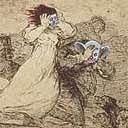
Goya's original anti-war message is lost. Of course, that's the point, right?
More recently, as shown in the Tate exhibition, they bought 19th century portraits and reworked them, like this:

The face is destroyed - poor guy, he commissioned a portrait figuring this was his claim on immortality...poof, up in smoke!
And there's nothing you or anyone can do to stop the Chapman brothers: they are the owners, they can do what they please.
If you don't own the art, you're in deep trouble as Polish artist Wlodzimierz Umaniec learned when he defaced a £5 million Rothko with a silly bit of writing:

His signature and then " a potential piece of yellowism". Why did he do that? Because he "admired" Rothko and felt he was following in the footsteps of Marcel Duchamp who famoursly turned a urinal into a work of art by writing on it. The Judge didn't buy this and jailed him for 2 years. Restoration in fact will take 20 months and cost more than £200,000.
So, if you want to leave your artistic mark by vandalizing another piece of art, the best way is to work on art you've acquired. Not an option open to a poor artist! To do it, you have to be rich like the Chapmans who can afford to buy Goya etchings...Nice guys, here they are:

What's your opinion?
Related articles
 Tate Britain: 'hypocritical' show celebrates art vandalism(theweek.co.uk)
Tate Britain: 'hypocritical' show celebrates art vandalism(theweek.co.uk) The Great Destroyer: Iconoclasm(kennedylive.wordpress.com)
The Great Destroyer: Iconoclasm(kennedylive.wordpress.com) The ultimate iconoclasm(asiahacks.com)
The ultimate iconoclasm(asiahacks.com)









Published on October 02, 2013 00:41
October 1, 2013
Heralding the Future in Bookselling: A Zero Commission Bookstore for Self-Published Authors
So far ebook stores have always taken a commission, varying between 30 and 70%. Now there's a newcomer in the publishing marketplace and it could be a real game changer: a zero-commission bookstore. It has a nice name: Bookstore Without Borders, reminiscent of the famous humanitarian aid agency
Médecins Sans Frontières
.
Curious? To find out how it works, see Novel Rocket's excellent post, click here.
To visit the bookstore click here.
This is how the opening page looks like (my screen shot):

The site is very new, so it has not yet achieved any meaningful ranking on Alexa. The available book list is still short but it's growing fast and BWB has established a presence on Goodreads since July 2013 (here) and people in the blogosphere have started to take note, for example Anastasia Pollack (here). The founders are really dynamic: Sara Mills, mother of six, is a freelance editor, book reviewer and author of two books; Lynda Baxter, with a strong background in the art world, is a web designer and SEO marketing expert; Scott Thompson with a long experience in the digital pre-press and printing industry, has developed a content management system that has made the BWB site both agile and functional.
Wondering about their business model? It's simple: for $99 you get a one time forever page on their site where you can upload up to 12 books. If you need more space, buy it, that's all there is to it. And of course, they offer a range of support services that you pay for. Go take a tour, and here's to their success!
To conclude on a more general note: the rise of small e-bookstores suggests that the future may not be all Amazon or other big digital department stores. There may be space for the small guy to set up his store next to the big guys like Amazon, just like in the last century when you had small boutiques in the vicinity of Saks 5th Avenue or Macy's...
If the analogy holds, it also suggests that the small e-book stores of the future, to succeed against the giant distributors, will need to set themselves up with a clear "personality" or brand upfront. You'd have, for example, an ebook store devoted to "All the Best in Romance", another focused on "Top Thrillers" etc. And that implies having the in-house capacity to identify the best books...
In my view that would really help readers to find their next good read. By the same token, it would help writers in resolving their biggest nightmare, the so-called "book discovery" problem, which is a polite way of saying that you fear your book has sunk out of sight in the tsunami of published books!
What's your opinion? Do small e-book stores have a future?
Related articles
 The Future of the Traditional Bookstore in a Digital World(goodereader.com)
The Future of the Traditional Bookstore in a Digital World(goodereader.com)
 An Industry Pining for Bookstores(scholarlykitchen.sspnet.org)
An Industry Pining for Bookstores(scholarlykitchen.sspnet.org)
 Can Self-Published Authors Acquire Shelf Space?(projecteve.com)
Can Self-Published Authors Acquire Shelf Space?(projecteve.com)
 'Please don't buy my book on Amazon,' author asks(q13fox.com)
'Please don't buy my book on Amazon,' author asks(q13fox.com)
 Indie bookstores on the rise(boingboing.net)
Indie bookstores on the rise(boingboing.net)










Curious? To find out how it works, see Novel Rocket's excellent post, click here.
To visit the bookstore click here.
This is how the opening page looks like (my screen shot):

The site is very new, so it has not yet achieved any meaningful ranking on Alexa. The available book list is still short but it's growing fast and BWB has established a presence on Goodreads since July 2013 (here) and people in the blogosphere have started to take note, for example Anastasia Pollack (here). The founders are really dynamic: Sara Mills, mother of six, is a freelance editor, book reviewer and author of two books; Lynda Baxter, with a strong background in the art world, is a web designer and SEO marketing expert; Scott Thompson with a long experience in the digital pre-press and printing industry, has developed a content management system that has made the BWB site both agile and functional.
Wondering about their business model? It's simple: for $99 you get a one time forever page on their site where you can upload up to 12 books. If you need more space, buy it, that's all there is to it. And of course, they offer a range of support services that you pay for. Go take a tour, and here's to their success!
To conclude on a more general note: the rise of small e-bookstores suggests that the future may not be all Amazon or other big digital department stores. There may be space for the small guy to set up his store next to the big guys like Amazon, just like in the last century when you had small boutiques in the vicinity of Saks 5th Avenue or Macy's...
If the analogy holds, it also suggests that the small e-book stores of the future, to succeed against the giant distributors, will need to set themselves up with a clear "personality" or brand upfront. You'd have, for example, an ebook store devoted to "All the Best in Romance", another focused on "Top Thrillers" etc. And that implies having the in-house capacity to identify the best books...
In my view that would really help readers to find their next good read. By the same token, it would help writers in resolving their biggest nightmare, the so-called "book discovery" problem, which is a polite way of saying that you fear your book has sunk out of sight in the tsunami of published books!
What's your opinion? Do small e-book stores have a future?
Related articles
 The Future of the Traditional Bookstore in a Digital World(goodereader.com)
The Future of the Traditional Bookstore in a Digital World(goodereader.com) An Industry Pining for Bookstores(scholarlykitchen.sspnet.org)
An Industry Pining for Bookstores(scholarlykitchen.sspnet.org) Can Self-Published Authors Acquire Shelf Space?(projecteve.com)
Can Self-Published Authors Acquire Shelf Space?(projecteve.com) 'Please don't buy my book on Amazon,' author asks(q13fox.com)
'Please don't buy my book on Amazon,' author asks(q13fox.com) Indie bookstores on the rise(boingboing.net)
Indie bookstores on the rise(boingboing.net)









Published on October 01, 2013 01:42
September 30, 2013
How Can A World Famous Architect Cause So Many Disasters?

Calatrava is world-famous and probably Spain's most important architect, with a fantastic entry on Wikipedia, that also defines him as a "sculptor and structural engineer". Yet, he's made so many blunders that the New York Times recently published an article called "A Star Architect Leaves Some Clients Fuming", recapping an incredibly long list of disasters, you can read it here.
Clients are fuming and that's not too surprising: not only are his cost overruns in the tens of millions of dollars, but the structures he builds are often not functional.
One example among many perfectly illustrates the problem: the footbridge with a pavement of glass bricks lit from underneath. A fantastic idea, you don't even need lamp posts to light it up at night. Brilliant, a work of art! Alas, it is so slippery when it rains, because of its nice curved shape, that people break their neck if they attempt to use it!
Here it is, a bridge crossing over Venice's grand canal:
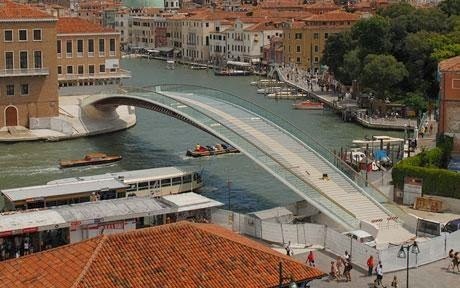
Planned in 1996, it suffered delays and spiraling costs and the City of Venice refused to inaugurate it with a ceremony when it was finally finished in September 2008 (see the Telegraph's article here) It even lacked access for the disabled.
Calatrava was very sorry there was no opening ceremony; he is very proud of it - he says he's built 40 bridges in 17 countries, and this one is his best.
Ah, it is certainly striking, especially at night, see here:
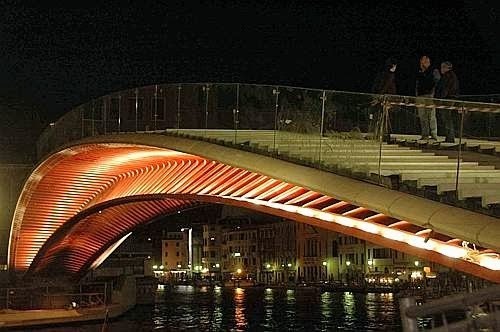
So in our day and age, does this mean Beauty trumps Usefulness? Or is it a lack of professionalism and we always fall for those who make a lot of smoke but there's no fire?
What do you think?
(Photo credit: Wikipedia, the concert hall of Santa Cruz de Tenerife; for the footbridge image, see http://travelfollownews.blogspot.it/2...)
Related articles
 The World Just Doesn't Get Trophy Architect Santiago Calatrava, but Dallas Does(blogs.dallasobserver.com)
The World Just Doesn't Get Trophy Architect Santiago Calatrava, but Dallas Does(blogs.dallasobserver.com) Meet the Spanish version of Frank Lloyd Wright (and not in a good way)(examiner.com)
Meet the Spanish version of Frank Lloyd Wright (and not in a good way)(examiner.com) What's Calatrava's architectural secret? Not sweating the small stuff(isteve.blogspot.com)
What's Calatrava's architectural secret? Not sweating the small stuff(isteve.blogspot.com)









Published on September 30, 2013 02:10
September 27, 2013
The Verdict is In: Serializing Your Novel Does Not Work!

Ever since Hugh Howey's WOOL became a success, serial novels have become the talk of the (publishing) town. Could serializing your novel work to sell it?
Serialization is nothing new, it was common back in Dickens' time. Serial novels were a standard feature of magazines which they helped to sell. In short, serial novels used to be very popular and not just in the English-speaking world. Dostoyevsky's masterpiece, the Brothers Karamazov, was published serially in a magazine, the famous French political and naturalist writer and Nobel winner Emile Zola likewise.
Has the digital revolution brought back their popularity?There is little doubt that Hugh Howey has made a success of the formula, he's sold the film rights to Twentieth Century Fox and made a print-only deal worth $500,000 with Simon and Schuster,
one of the Big Five publishers. A lot of people in the publishing industry thought that perhaps he had hit on something.
A new marketing ploy that works.
Consider the facts: so many people have Kindles and e-readers, tablets and smart phones nowadays, surely the format
makes sense if you sell each part at a low price and move the readers to buy the next installment.
But it's a mirage. This ignores two fundamental obstacles:
1. Readers don't know what serialization is and they don't care. When they buy something for their Kindle, they want a good story, not something in bits and pieces, and above all, not something that's too short. Even though they might have paid very little for it or even gotten it free (the case with WOOL's first installment that is perma-free).
2. WOOL could be a "black swan", i.e. an exceedingly rare event, "highly improbable" as Nassim Taleb has explained; therefore it is not a model to follow.
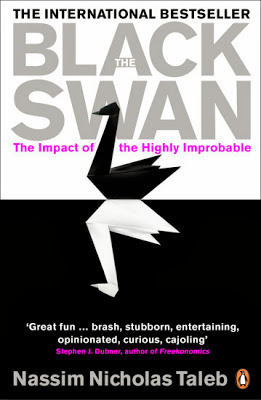
Indeed, a lot of people (see article below) don't like Howey's writing, even though he's sold over a million copies of WOOL.
In spite of the risk, I thought I would be brave and try serializing my new novel FOREVER YOUNG and see how it would go. I set it at 99 cents and published it on Amazon in March 2013 (see here).
Well, the verdict is in, it didn't go. The first installment sold reasonably well, the second, that came out 6 weeks later, lagged behind (with few reviews, only three). The linkage between the two did not occur as expected.
Don't say I allowed for too much time between the two, that doesn't seem to matter. With WOOL, Howey let much more time go by!
Was the book simply bad? Not likely. On ReadWave where an early (and shorter) version (under the title "Programmed to Die") was published, it got a surprisingly large number of reads and "likes" (well over 1,000 when most average 50 to 100 on that site, see here). On Amazon, I quickly got 11 reviews when I first published it (and still getting them, the latest was a week ago). But I noticed something very worrying: at least 3 of the 11 reviewers had not understood that this was merely the first installment of a novel, that they were getting something like 15 percent of it, not more. Yet they claimed it felt "rushed", more like a short story. They clearly were dissatisfied with not getting more (you can see the reviews here)
An additional problem cropped up recently with serialization: I discovered most serious publishers, even those who are into digital publishing, won't consider publishing a novel serially. Likewise for marketing. Tellingly, Bookbub, one of the fastest growing ebook deals site, closing in on 1.5 million subscribers, does not accept serial novels .
Amazing, but the
core of the publishing industry is not ready for serialization. So why
should we poor writers be the guinea pigs and risk it when they don't?
In a nutshell, that's
why I'm contemplating suspension of the serialization of FOREVER YOUNG
and going straight to full publication. Is that a good idea? What's
your advice?
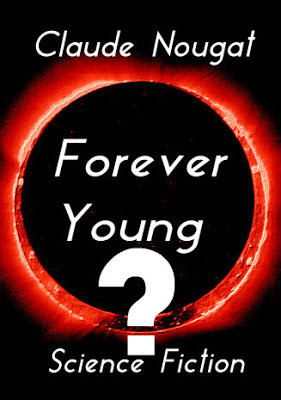
To serialize or not, to be or not to be?
Related articles
 Return Of The Serial Reader(theliteraryatlas.wordpress.com)
Return Of The Serial Reader(theliteraryatlas.wordpress.com) Aspiring authors take note!(freemanpr.wordpress.com)
Aspiring authors take note!(freemanpr.wordpress.com) Wool by Hugh Howey, rating: 2/6(scifireviewsandgiveaways.com)
Wool by Hugh Howey, rating: 2/6(scifireviewsandgiveaways.com)









Published on September 27, 2013 02:18
September 26, 2013
How To Write A Smashing Book Description for Your Book:Tips from a Pro
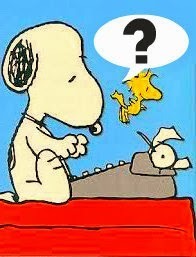
It may come as a surprise to most readers, but writers are generally unable to write an enticing description of their books, the kind that sends you to click the "buy" button. Even fiction writers, with all their imagination, suck at this.
Except for a few writers who are also good copywriters and know how to write the kind of ad that drives buyers to buy.
Like Mathew Kadish. He sells lots of books AND he's got valuable copywriting experience.
Here's his advice in 10 tips (and in my own words). By the way, the tips are applicable to anything you're selling, provided it's as complex as a book.
1. Don't think of it as a summary of your book, it's not a synopsis; think of it as an advertisement (summaries are boring, ads are enticing)
2. Assume your reader hasn't got a clue of what your book is about;
3. Use simple, striking language, don't get lost in big words and complex sentences;
4. Don't make it too long or too short, 3 to 5 paragraphs is about right;
5. Focus on the conflict/drama in your book, not the stuff around it, forget the details;
6. Leave people with a good hook at the end so that they want to grab your book to find out "what happens next";
7. No quotes, no gimmicks, no Bible verses, no song lyrics, no literary references: that "jazz" sounds pretentious;
8. Something cool or quirky about your book can be showcased as long as it doesn't take up too much space;
9. Don't compare your book to any other book, the comparison is more likely to damage than help: it makes you look like a second fiddler;
10. Don't address your reader in the book description: it should be self-standing and read like a story in itself...
But for much more detailed advice and in Mathew Kadish's inimitable style, click here:
http://matthewkadish.com/ten-tips-for-writing-a-great-book-synopsis-for-amazon
I would add one more tip:
11. If your book was written for a special reason, like a major event in your own life, some unique experience you've had or a special skill, do tell it! Don't leave people in the dark about how or why your book was born - provided it's something really out of the ordinary. No bragging please or it might turn against you!
Can you think of anything else? Please share!
(Photo credit: from http://www.jamesaltucher.com/2012/01/...)










Published on September 26, 2013 01:05
September 25, 2013
Why Angela Merkel is in a Bind

Angela
Merkel's victory has surprised no one. Her re-election to a third term
as Chancellor was an easy ride and a personal triumph. Most Germans
viewed her as the Mutter who has preserved them from the recession that
has afflicted the rest of Europe.
But
now her real troubles begin. She has to form a coalition government but
everyone expects it will take her a lot of time, maybe two months.
The Italian press makes her problems a lot clearer than the New York Times and I thought I'd share with you what I found in La Stampa
of 23 September (articles of Francesca Sforza, Tonia
Mastrobuoninviata). If you don't speak Italian, here is the situation in
a nutshell.
Merkel
cannot govern alone. But prospective partners are leery. In the past
eight years, she has destroyed her junior partners who lost substantial
percentages of their voters. This happened, in her first term, to the
socialists and in her second term, to the Free Democrats who fell below
the minimum 5 percent threshold needed to enter Parliament.
Small wonder the socialists - the Social Democratic Party
- are cautious. They've asked her to wait until they have a meeting
this coming Friday to decide exactly what their position in any new
government would be and what they would ask her. Establishing a platform
first before entering into a partnership with Ms. Merkel is undoubtedly
a wise move (and one that has been hailed in the Italian press: this is
something Italian politicians never think of doing). It should protect
the party later from any defections.
Moreover, they need to digest their defeat which everyone assigns to Peer Steinbruck who was clearly a poor choice to run against Merkel. Not the first time a socialist party picks the wrong candidate! But moving away from Steinbruck may mean rejuvenating the party and making it more socially-conscious and less conservative and rightist.
Because
the Social Democrats in Germany, like socialists elsewhere in Europe
(it must be in their DNA!), have famously been torn by doubt and dissension,
notably when Oskar Lafontaine had a fight with Gerard Schroeder over his "Agenda 2010"
- the policy measures that relaunched Germany and pulled it out of its
status as "the sick man of Europe", as it was known in the early 2000s.
Oskar Lafontaine left the Social Democrats and went on to create Linke, a
radical party to the left.
But Angela Merkel is not without her own problems. If she has sailed to victory, it is largely thanks to the Christian Social Union
votes, the Bavarian "cousins", who took 50% of the votes in Bavaria.
The CSU also known as the party of the "Laptop and Lederhosen" (the
famous leather trousers) is of course traditionally allied to her
Christian Democrats. But the two don't see eye to eye on everything.
There are two points on which they disagree. For the CSU:
1.
any alliance with the Greens is out; the Greens many years ago (from
1980 to 1993) had included in their program the "liberalization of
sexual relations with children", a nice term for pedophilia!
2.
they won't enter any coalition government unless a measure to introduce
tolls on the major German highways is adopted, but with toll payments
only applicable to foreigners.
Now,
apart from the fact that such a measure is unpleasantly anti-European,
it is obviously very difficult to implement since there are no customs
offices on the borders (like in Switzerland, for example, where
foreigners entering with their cars do have to pay). It would be a lot
easier to make everyone pay, regardless of nationality. An additional
problem is that Merkel's party, the Christian Democrats, don't agree
with the idea.
For
the first time I feel almost sorry for Ms. Merkel. It won't be easy to
put all these people together, and dropping the socialists to work with
the Greens is pretty much unthinkable.
What is going to be the likely result of all this for Europe?
We
all know that so far Merkel has been tough on Europe, insisting on
austerity even though it is clear that this is not the solution. More
austerity leads to a deeper recession and more debt as I have often
blogged here. Fiscal policies, to work, must always be counter-cyclical.
The moment to reduce the debt is when an economy is booming, not when
it's in the doldrums. Will she continue to do so?
In her first public declaration after her victory, she insisted there would be no change for Europe.
But
my hopes are that there will be some changes. The
Free Democrats who were anti-Europe and pro-austerity are gone for
good. The socialists are likely to be a lot less pro-austerity as they
seek to implement their own social programs (pension reform, education,
stimulus to consumption etc) and they are also notoriously pro-Europe.
So
yes, I do believe something might change in favor of Europe. Angela
Merkel has always called for "more Europe" but never meant it. Now she
might have to turn to concrete measures rather than limit herself to
slogans...
What do you think?










Published on September 25, 2013 03:48
September 24, 2013
The Best Acceptance Speech Ever: Ten Words!

Everyone should follow actress Merritt Wever's example when she received her Emmy award.
...The only way to ensure that acceptance speeches stop being the torture they are!
See here:
"Thanks so much, thank you so much; gotta go, bye!"
Love it, yeah, exactly to the point...










Published on September 24, 2013 00:59
September 23, 2013
The Top 20 Most Beautiful Rooms in the World and What is Odd About Them
I recently stumbled upon - or rather, I was alerted by StumbleUpon - to the "Top 20 World Most Beautiful Living Spaces" in the Ultra Home Magazine and I was wowed!
Click here to see them.
What is most astonishing about such rooms that no doubt characterize the tastes of the One Percent is the fixation on linking the indoors with the outdoors.
The design of everyone one of them is entirely focused on the concept of bringing Nature inside of the room, even when the furniture and fixtures, fireplaces etc are highly sophisticated, like in this lovely chalet in Zermatt, Switzerland (the Firefly Ski Chalet):

The view is what matters. Yes, here you zero in on the Matterhorn, you can't avoid it!
This is just the sort of place where in my novel Forever Young beautiful Emma stops after skiing with Sergio, on the last day of her life, knowing she has only five hours left to live (in case you don't know, that's my science fiction novel, set 200 years from now, soon to be published as a whole book - on Amazon for now you find only Part One for a paltry 99 cents, just to give you a foretaste...).
And in the Maldives, the fixation on the outdoors was brought to a paroxysm: a bedroom was created on the bottom of the sea, bringing the swimming fish literally within reach of your hands when you wake up:

Beautiful... Though I personally find that underwater feeling a little oppressive.
There was only one of the twenty rooms that was focused on itself, a so-called "converted cathedral":

Here the focus is on the rose window, you can't see outside! But note that it's not stained glass - presumably Time has done away with it. The owners didn't turn to imitation stained glass and rightly so, it's often a poor choice, the art has been largely lost. They used thick, grey-colored glass. The effect is similar to stained glass: it is not see-through. A deliberate choice to turn the dwellers' gaze indoors! And that of course makes the room most unusual.
What do you think? Which room do you like best?
Why do you suppose the ultra rich nowadays seek to reach outdoors instead of concentrating on the design of the interior, as kings and nobles used to do in their palaces, turning them into sumptuous marvels for their own sake?










Click here to see them.
What is most astonishing about such rooms that no doubt characterize the tastes of the One Percent is the fixation on linking the indoors with the outdoors.
The design of everyone one of them is entirely focused on the concept of bringing Nature inside of the room, even when the furniture and fixtures, fireplaces etc are highly sophisticated, like in this lovely chalet in Zermatt, Switzerland (the Firefly Ski Chalet):

The view is what matters. Yes, here you zero in on the Matterhorn, you can't avoid it!
This is just the sort of place where in my novel Forever Young beautiful Emma stops after skiing with Sergio, on the last day of her life, knowing she has only five hours left to live (in case you don't know, that's my science fiction novel, set 200 years from now, soon to be published as a whole book - on Amazon for now you find only Part One for a paltry 99 cents, just to give you a foretaste...).
And in the Maldives, the fixation on the outdoors was brought to a paroxysm: a bedroom was created on the bottom of the sea, bringing the swimming fish literally within reach of your hands when you wake up:

Beautiful... Though I personally find that underwater feeling a little oppressive.
There was only one of the twenty rooms that was focused on itself, a so-called "converted cathedral":

Here the focus is on the rose window, you can't see outside! But note that it's not stained glass - presumably Time has done away with it. The owners didn't turn to imitation stained glass and rightly so, it's often a poor choice, the art has been largely lost. They used thick, grey-colored glass. The effect is similar to stained glass: it is not see-through. A deliberate choice to turn the dwellers' gaze indoors! And that of course makes the room most unusual.
What do you think? Which room do you like best?
Why do you suppose the ultra rich nowadays seek to reach outdoors instead of concentrating on the design of the interior, as kings and nobles used to do in their palaces, turning them into sumptuous marvels for their own sake?










Published on September 23, 2013 00:55
September 19, 2013
How Rebellious is a Baby Boomer? Answer: Very!

Baby Boomers hold 75% of American wealth and that percentage is no doubt similar in other developed countries. Hence, when the American government recently reported boomers were abusing drugs in record number (see here), the assumption is that, given their wealth, the scope for drug abuse is exceptionally large.
Rising drug abuse? Not nice. Perhaps not so surprising when you consider that boomers are the "sandwich generation": they have to look after their parents and because of the 2008 recession, they also often have to look after their grown-up children out of a job. Not to mention the sad fact that many have lost their job or their home. The pressure is often unbearable, drugs are an understandable reaction, even if they solve nothing and in fact make matters worse.
The boomer generation is also famous for its rebellious stance. But drugs need not be part of it. Author Marsha Robert's answer to the question how rebellious is a Baby Boomer, is quite simply... very rebellious, more than that, in her own words: "instinctively mutinous"! But that does not imply drug taking. Her kind of rebellion is not a depressing refuge into drugs, not at all.
It's a joyous "go for it", it's a "yes, you can".
She has written a whole book about it, you should check it out. Here's my review on Goodreads and Amazon (where you can buy the book):
 Confessions of an Instinctively Mutinous Baby Boomer: And Her Parable of the Tomato Plant by Marsha Roberts
Confessions of an Instinctively Mutinous Baby Boomer: And Her Parable of the Tomato Plant by Marsha RobertsMy rating: 5 of 5 stars
This is a highly inspirational read, told in a warm voice full of life and optimism. Indeed, the optimistic note is struck right from the start and keeps ringing throughout the book and through the recounting of the sadder and more tragic events, like the loss of the author's mother or the sudden death of her best friend. These are less "confessions" (in that sense the title is a little misleading) than a string of well-chosen parables (and here the sub-title is spot on). Those parables are really high points or events in the author's life that have held a particular meaning, more like allegories. In fact, she sees in the major events marking her life as a "baby boomer" allegories of a higher power, of God. This is a deeply religious book, one that will uplift you: recommended reading if you are going through difficult times of your own|
Out of each event, the author draws comfort and re-affirmation of the power of Almighty God. And manages to do so in a chatty voice, overflowing with love. You find yourself led into another world of strong faith and unshakable trust that in the end, no matter what happens, things will turn all right. The closing paragraphs tell it all, when the author writes: "I know that faith and love and joy are the keys to unlock the miracles God has already put in place for us. So I'm determined to be full of all three of them. It's my job." Indeed, Marsha Roberts has made it her job to be full of faith, love and joy and we, her readers (at least I am speaking for myself) are thankful to her for doing so and being the person she is. She concludes: "I can't see through the fog, but God can and that's good enough for me". That's a very powerful image...
On another level, I was fascinated by the so very American "can do" approach displayed in this book: nothing ever seems to get Ms. Roberts down and if she does go down on her knees, it's to pray, not to bend over. That's not part of her vocabulary nor even a possibility! She even managed to overcome the pain of getting her home foreclosed, losing it and having to relocate in record time - a devastating drama for most people. Remarkable dynamism and optimism, so very American and no doubt one of the reasons why the US is now slowly coming out of the 2008 Big Recession while Europe is still deep in it.
View all my reviews on Goodreads
Just one more word: Marsha's book is a perfect example of this rising new genre, Boomer Lit. Nine months ago,I created a group on Goodreads to discuss it and so far some 450 readers and writers joined it. To visit the group, click here.
To buy her book, you will find it on all major e-tailers, for Amazon, click here:
Happy reading and please let me know how you like her book!
(Source of picture: my own, when I visited the Stedelijk Museum in Amsterdam; the sculpture on foreground is Jeff Koons)
Related articles
 Why Brands Need to Stop Ignoring the 'Invisible Goldmine' of Baby Boomer Women(mediabistro.com)
Why Brands Need to Stop Ignoring the 'Invisible Goldmine' of Baby Boomer Women(mediabistro.com) In Danger of Getting Outsourced? Baby Boomers Look for Answers!(planbsuccessteam.wordpress.com)
In Danger of Getting Outsourced? Baby Boomers Look for Answers!(planbsuccessteam.wordpress.com) Baby Boomers Are Surpassing Gen-Y As Entrepreneurs(bizsugar.com)
Baby Boomers Are Surpassing Gen-Y As Entrepreneurs(bizsugar.com) Boomers Reinvent Themselves(boomerseniorcontent.wordpress.com)
Boomers Reinvent Themselves(boomerseniorcontent.wordpress.com)









Published on September 19, 2013 22:25



